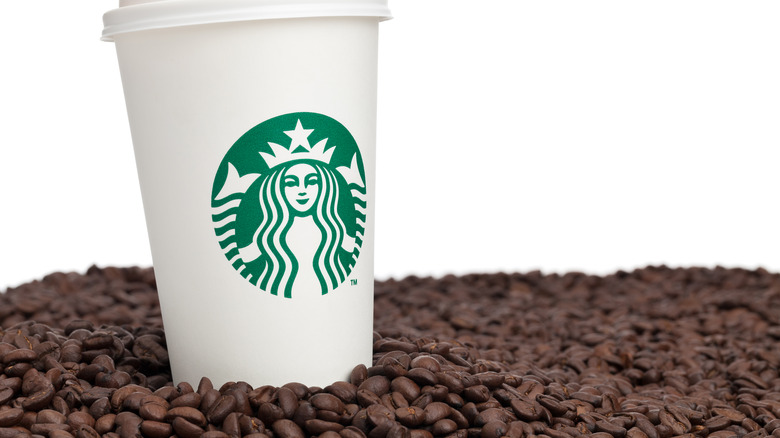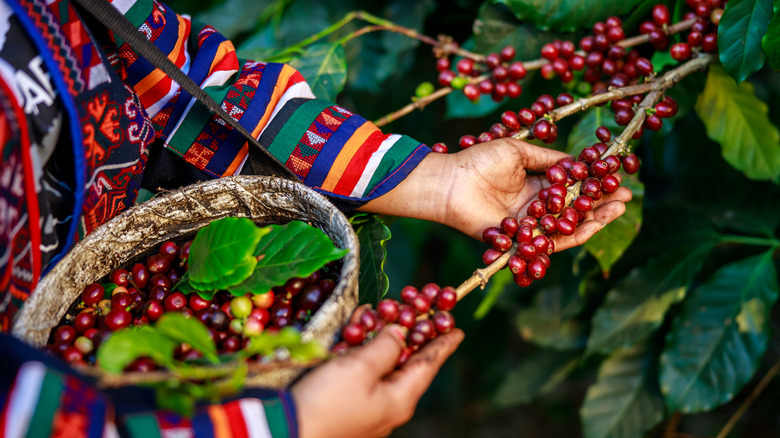The Type Of Coffee Starbucks Uses In Its Stores
Any Starbucks coffee fan knows there is something unique about the chain's iconic roast. Whether you're ordering a Caramel Macchiato or enjoying a tall, hot black, the distinct flavor of the coffee always stands apart from other java joints. Part of the reason why is that Starbucks heavily invests in sourcing the most flavorful coffee beans available. The only type of bean they use in their caffeine-infused drinks is the arabica bean.
Roughly 60% of the coffee consumed worldwide comes from the arabica coffee bean, with the other 40% typically made with the robusta variety. Some coffee blends, like breakfast blend and French blend, are made with a combination of either various arabica strains or a mix of arabica and robusta beans, but Starbucks only uses 100% arabica beans in all of their blends. While many other businesses also use arabica beans for their signature roasts, Starbucks goes above and beyond when it comes to sourcing their beans. Arabica coffee beans aren't as easy to grow as the robusta variety, and this is why Starbucks has dedicated its time and resources to discovering more about the plant and the science behind how it's grown.
What are arabica beans?
Coffee is a fruit from the coffee tree, which produces bright red cherries that contain green coffee beans. A few different species are grown and harvested in various regions, but the most popular types are Coffea arabica and Coffea canephora, more commonly known as robusta coffee. The Coffea canephora plant is easier to grow than Coffea arabica, and the beans are popular for use in instant coffee.
Compared to robusta beans, arabica coffee beans are widely appreciated for their elevated flavor profile. Aaron Robinson, Starbucks' Coffee Engagement Manager, says of arabica coffee on the Starbucks website, "Arabica can be elegant. It can be complex. It can have body and acidity that is interesting and can be used and played with and blended into new, interesting tastes."
The mosaic of fruity and bitter flavors attributed to arabica coffee develops because of how the arabica coffee plant grows. There is a terroir to coffee, much like wine, meaning the flavor is affected by the environment where the coffee is grown. Due to arabica coffee being grown at a higher elevation, as well as other terrain factors, the beans can develop a sweeter, more complex flavor profile compared to robusta.
Starbucks sources arabica from all over the world
The Green Mermaid is responsible for purchasing 3% of the world's coffee supply, and they source that staggering amount of coffee from over 400,000 farms in 30 countries around the globe. With coffee as their signature product, it makes sense that Starbucks is dedicated to understanding how it's grown. In 2013, the java giant purchased a coffee farm in Costa Rica to better understand the process of growing coffee and to look for ways to improve the process. Even today, they continue to search for better, more sustainable ways to produce coffee that they hope will benefit coffee growers worldwide.
As of 2021, Starbucks operates over 30,000 stores in 80 countries worldwide. With no signs of slowing down, the importance of understanding how to produce the best arabica beans possible isn't taken for granted at Starbucks. As they continue to expand their coffee empire, they are also committed to ethical sourcing practices. By 2015, they met their goal of ethically sourcing 99% of their arabica beans, and they are on their way to meeting a milestone of providing 100 million coffee trees to farmers around the globe. And because of their commitment to using only the best, those trees will certainly be Coffea arabica.


